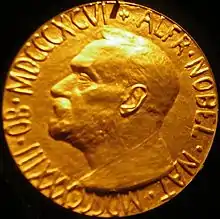Trygve Haavelmo
Trygve Magnus Haavelmo (d. 13 Aralık 1911 Skedsmo, Norveç - ö. 26 Temmuz 1999 Eiksmarka, Norveç). Norveçli istatistikci, iktisatçı ve ekonometrici. 1989'da Nobel Ekonomi Ödülü'nü kazanmıştır.
Trygve Haavelmo | |
|---|---|
 | |
| Doğum |
13 Aralık 1911 Skedsmo, Norveç |
| Ölüm |
26 Temmuz 1999 (91 yaşında) Eiksmarka, Norveç |
| Milliyet | Norveç |
| Eğitim | Oslo Üniversitesi |
| Ödüller |
|
| Kariyeri | |
| Dalı | Makroktisat, Ekonometri |
| Çalıştığı kurumlar |
Aarhus Üniversitesi Chicago Üniversitesi Oslo Üniversitesi |
| Etkilendikleri | Dennis Robertson, John Maynard Keynes |
| Etkiledikleri |
Paul Krugman, Richard Stone |
Hayatı
Trygve Haavelmo Norveç'te 1911'de doğmuştur. Üniversite öğrenimini Oslo Üniversitesi'nde tanınmış Norveçli iktisatcı Ragnar Frisch'in öğrencisi olarak kazanmıştir. 1939'da bir Fulbright Bursu ile ABD'ne gitmiş ve orada 1947'ye kadar kalmıştır. II. Dünya Savaşı sırasında New York Şehri belediye idaresinin İstatistik Departman'ında çalışmıştır. Diğer zamanlarda Cowles İktisadi Araştırma Komisyonu'unda araştırmacı olarak iktisat, istatistik ve ekonometri üzerinde üstün çalışmalar göstermiştir.. 1944'te bitirmis olduğu Ekonometri'ye İstatistiksel Yaklaşım adlı tez çalışması ile 1946'da Ph. D. doktora derecesi kazanmıştır. 1947'de Norveç'e dönmüş ve 1947-48'de Norveç Ticaret Bakanlığı'nda daire başkanı olarak görev yapmıştır. 1948de Oslo Üniversitesi'ne İktisat ve İstatistik Profesörü olarak atanmıştır. Bu makamda 1979'da emekli oluncaya kadar kalmıştır.
Trygve Haavelmo ekonometri bilim dalının kurucularindan sayılmaktadır. Makroekonomi üzerinde yapmış olduğu araştırmalar hükûmetlerin mekroekonomiyi idare etmelerine ana kaynak sağlamış ve İkinci Dünya Savaşı'ndan 1970'li yıllara kadar iktisadi politikaların temeli olmuştur. Denk bütçe çarpanı hakkında yazdığı makale en tutucu denk bütçe kurallarına uyan hükûmetlerin bile iktisadi dalgalanmalara müdahale edebileceklerini açıklayıp fertleri kapitalist piyasaların acımasız iniş buhranlarında çaresiz bırakılmaması gereği için önemli bir teorik dayanak olmuştur.[1]
Bibliyografya
- 1938. "The Method of Supplementary Confluent Relations", Econometrica.
- 1940. "The Inadequacy of Testing Dynamic Theory by Comparing the Theoretical Solutions and Observed Cycles", Econometrica .
- 1943. "Statistical Testing of Business Cycles", Review of Economic and Statistics.
- 1943. "The Statistical Implications of a System of Simultaneous Equations", Econometrica.
- 1944. "The Probability Approach in Econometrics", 1944, Econometrica.
- 1945. "Multiplier Effects of a Balanced Budget", Econometrica ("Supplementary Notes", 1946).
- 1947. "Family Expenditures and the Marginal Propensity to Consume", Econometrica.
- 1947. "Methods of Measuring the Marginal Propensity to Consume", 1947, Journal of American Statistical Association.
- 1947. "Statistical Analysis of the Demand for Food: Examples of Simultaneous Estimation of Structural Equations", M. A. Girshick ile birlikte Econometrica.
- 1947. "Family Expenditures and the Marginal Propensity to Consume", Econometrica.
- 1947 "Quantitative Research in Agricultural Economics: The Interdependence Between Agriculture and the National Economy", Journal of Farm Economics.
- 1949 "The Notion of Involuntary Economic Decisions", Economic Journal.
- 1950 "A Note on the Theory of Investment", Review of Economic and Statistics'.
- 1951 "The Concepts of Modern Theories of Inflation", Eknomisk Tidssk.
- 1954 A Study in the Theory of Economic Evolution.
- 1958 "The Role of the Econometrician in the Advancement of Economic Theory", Econometrica.
- 1960 A Study in the Theory of Investment.
- 1968 "Business Cycles II: Mathematical Models", IESS.
- 1972 Variation on a Theme by Gossen, (İsveççe).
- 1974 "What Can Static Equilibrium models Tell Us?", Economic Inquiry.
- 1990 "Econometrics and the Welfare State", Les Prix Nobel de 1989.
Kaynakça
- Read, Colin, 1959-. The econometricians : Gauss, Galton, Pearson, Fisher, Hotelling, Cowles, Frisch and Haavelmo. Londra. s. 223-245. ISBN 978-1-137-34137-2. OCLC 963588035.
